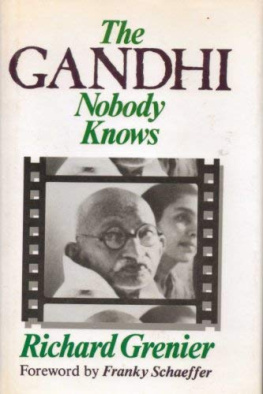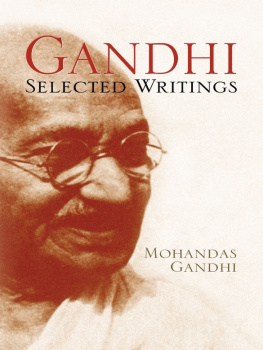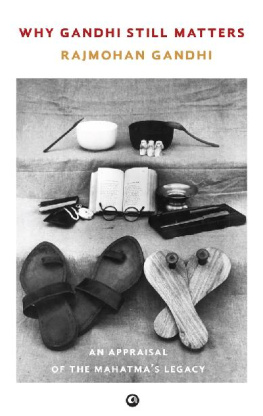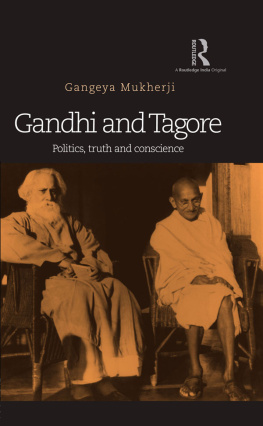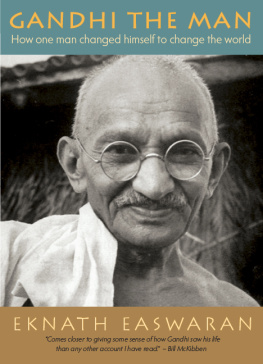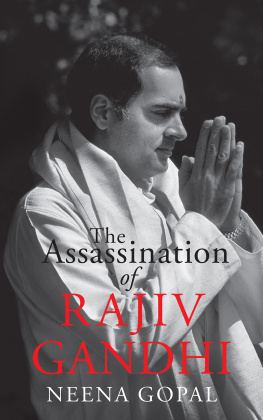Richard Grenier - The Gandhi Nobody Knows
Here you can read online Richard Grenier - The Gandhi Nobody Knows full text of the book (entire story) in english for free. Download pdf and epub, get meaning, cover and reviews about this ebook. year: 1983, publisher: Thomas Nelson Publishers, genre: Art. Description of the work, (preface) as well as reviews are available. Best literature library LitArk.com created for fans of good reading and offers a wide selection of genres:
Romance novel
Science fiction
Adventure
Detective
Science
History
Home and family
Prose
Art
Politics
Computer
Non-fiction
Religion
Business
Children
Humor
Choose a favorite category and find really read worthwhile books. Enjoy immersion in the world of imagination, feel the emotions of the characters or learn something new for yourself, make an fascinating discovery.
- Book:The Gandhi Nobody Knows
- Author:
- Publisher:Thomas Nelson Publishers
- Genre:
- Year:1983
- Rating:4.5 / 5
- Favourites:Add to favourites
- Your mark:
- 100
- 1
- 2
- 3
- 4
- 5
The Gandhi Nobody Knows: summary, description and annotation
We offer to read an annotation, description, summary or preface (depends on what the author of the book "The Gandhi Nobody Knows" wrote himself). If you haven't found the necessary information about the book — write in the comments, we will try to find it.
The Gandhi Nobody Knows — read online for free the complete book (whole text) full work
Below is the text of the book, divided by pages. System saving the place of the last page read, allows you to conveniently read the book "The Gandhi Nobody Knows" online for free, without having to search again every time where you left off. Put a bookmark, and you can go to the page where you finished reading at any time.
Font size:
Interval:
Bookmark:
The Gandhi Nobody Knows Richard Grenier
[From the magazine, Commentary, March 1983, published monthly by the American Jewish Committee, New York, NY.]
I HAD the singular honor of attending an early private screening of Gandhi with an audience of invited guests from the National Council of Churches. At the end of the three-hour movie there was hardly, as they say, a dry eye in the house. When the lights came up I fell into conversation with a young woman who observed, reverently, that Gandhis last words were Oh, God, causing me to remark regretfully that the real Gandhi had not spoken in English, but had cried, Hai Rama! (Oh, Rama). Well, Rama was just Indian for God, she replied, at which I felt compelled to explain that, alas, Rama, collectively with his three half-brothers, represented the seventh reincarnation of Vishnu. The young woman, who seemed to have been under the impression that Hinduism was Christianity under another name, sensed somehow that she had fallen on an uncongenial spirit, and the conversation ended.
At a dinner party shortly afterward, a friend of mine, who had visited India many times and even gone to the trouble of learning Hindi, objected strenuously that the picture of Gandhi that emerges in the movie is grossly inaccurate, omitting, as one of many examples, that when Gandhis wife lay dying of pneumonia and British doctors insisted that a shot of penicillin would save her, Gandhi refused to have this alien medicine injected in her body and simply let her die. (It must be noted that when Gandhi contracted malaria shortly afterward he accepted for himself the alien medicine quinine, and that when he had appendicitis he allowed British doctors to perform on him the alien outrage of an appendectomy.) All of this produced a wistful mooing from an editor of a major newspaper and a recalcitrant, But still. I would prefer to explicate things more substantial than a wistful mooing, but there is little doubt it meant the editor in question felt that even if the real Mohandas K. Gandhi had been different from the Gandhi of the movie it would have been nice if he had been like the movie-Gandhi, and that presenting him in this admittedly false manner was beautiful, stirring, and perhaps socially beneficial.
An important step in the canonization of this movie-Gandhi was taken by the New York Film Critics Circle, which not only awarded the picture its prize as best film of 1982, but awarded Ben Kingsley, who played Gandhi (a remarkably good performance), its prize as best actor of the year. But I cannot believe for one second that these awards were made independently of the films contentwhich, not to put too fine a point on it, is an all-out appeal for pacifismor in anything but the most shameful ignorance of the historical Gandhi.
Now it does not bother me that Shakespeare omitted from his King John the signing of the Magna Chartaby far the most important event in Johns reign. All Shakespeares histories are strewn with errors and inventions. Shifting to the cinema and to more recent times, it is hard for me to work up much indignation over the fact that neither Eisensteins Battleship Potemkin nor his October recounts historical episodes in anything like the manner in which they actually occurred (the famous march of the White Guards down the steps at Odessaartistically one of the greatest sequences in film historysimply did not take place). As we draw closer to the present, however, the problem becomes much more difficult. If the Soviet Union were to make an artistically wondrous film about the entry of Russian tanks into Prague in 1968 (an event I happened to witness), and show them being greeted with flowers by a grateful populace, the Czechs dancing in the streets with joy, I do not guarantee that I would maintain my serene aloofness. A great deal depends on whether the historical events represented in a movie are intended to be taken as substantially true, and also on whetherseparated from us by some decades or occurring yesterdaythey are seen as having a direct bearing on courses of action now open to us.
On my second viewing of Gandhi, this time at a public showing at the end of the Christmas season, I happened to leave the theater behind three teenage girls, apparently from one of Manhattans fashionable private schools. Gandhi was pretty much an FDR, one opined, astonishing me almost as much by her breezy use of initials to invoke a President who died almost a quarter-century before her birth as by the stupefying nature of the comparison. But he was a religious figure, too, corrected one of her friends, adding somewhat smugly, Its not in our historical tradition to honor spiritual leaders. Since her schoolteachers had clearly not led her to consider Jonathan Edwards and Roger Williams as spiritual leaders, let alone Joseph Smith and William Jennings Bryan, the intimation seemed to be that we are a society with poorer spiritual values than, lets say, India. There can be no question, in any event, that the girls felt they had just been shown the historical Gandhian attitude shared by Ralph Nader, who at last account had seen the film three times. Nader has conceived the most extraordinary notion that Gandhis symbolic flouting of the British salt tax was a consumer issue which he later expanded into the wider one of Indian independence. A modern parallel to Gandhis program of home-spinning and home-weaving, another consumer issue says Nader, might be the use of solar energy to free us from the giant multinational oil corporations.
AS IT happens, the government of India openly admits to having provided one-third of the financing of Gandhi out of state funds, straight out of the national treasuryand after close study of the finished product I would not be a bit surprised to hear that it was 100 percent. If Pandit Nehru is portrayed flatteringly in the film, one must remember that Nehru himself took part in the initial story conferences (he originally wanted Gandhi to be played by Alec Guinness) and that his daughter Indira Gandhi is, after all, Prime Minister of India (though no relation to Mohandas Gandhi). The screenplay was checked and rechecked by Indian officials at every stage, often by the Prime Minister herself, with close consultations on plot and even casting. If the movie contains a particularly poisonous portrait of Mohammed Ali Jinnah, the founder of Pakistan, the Indian reply, I suppose, would be that if the Pakistanis want an attractive portrayal of Jinnah let them pay for their own movie. A friend of mine, highly sophisticated in political matters but innocent about film-making, declared that Gandhi should be preceded by the legend: The following film is a paid political advertisement by the government of India.
Gandhi, then, is a large, pious, historical morality tale centered on a saintly, sanitized Mahatma Gandhi cleansed of anything too embarrassingly Hindu (the word caste is not mentioned from one end of the film to the other) and, indeed, of most of the rest of Gandhis life, much of which would drastically diminish his saintliness in Western eyes. There is little to indicate that the India of today has followed Gandhis precepts in almost nothing. There is little, in fact, to indicate that India is even India. The spectator realizes the scene is the Indian subcontinent because there are thousands of extras dressed in dhotis and saris. The characters go about talking in these quaint Peter Sellers accents. We have occasional shots of Indias holy poverty, holy hovels, some landscapes, many of them photographed quite beautifully, for those who like travelogues. We have a character called Lord Mountbatten (Indias last Viceroy); a composite American journalist (assembled >from Vincent Sheehan, William L. Shirer, Louis Fischer, and straight fiction); a character called simply Viceroy (presumably another composite); an assemblage of Gandhis Indian followers under the name of one of them (Patel); and of course Nehru.
Next pageFont size:
Interval:
Bookmark:
Similar books «The Gandhi Nobody Knows»
Look at similar books to The Gandhi Nobody Knows. We have selected literature similar in name and meaning in the hope of providing readers with more options to find new, interesting, not yet read works.
Discussion, reviews of the book The Gandhi Nobody Knows and just readers' own opinions. Leave your comments, write what you think about the work, its meaning or the main characters. Specify what exactly you liked and what you didn't like, and why you think so.

